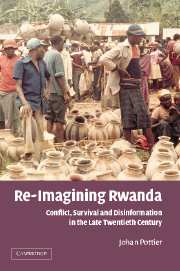Book contents
- Frontmatter
- Contents
- List of maps
- Acknowledgements
- List of abbreviations
- Rwanda
- Great Lakes region
- Rwanda: refugees and displaced populations, 31 March 1995
- Introduction: information and disinformation in times of conflict
- 1 Build-up to war and genocide: society and economy in Rwanda and eastern Zaire
- 2 Mind the gap: how the international press reported on society, politics and history
- 3 For beginners, by beginners: knowledge construction under the Rwandese Patriotic Front
- 4 Labelling refugees: international aid and the discourse of genocide
- 5 Masterclass in surreal diplomacy: understanding the culture of ‘political correctness’
- 6 Land and social development: challenges, proposals and their imagery
- Conclusion: representation and destiny
- Appendix: Summary of key dates and events
- Notes
- Bibliography
- Index
- Titles in the series
Introduction: information and disinformation in times of conflict
Published online by Cambridge University Press: 22 September 2009
- Frontmatter
- Contents
- List of maps
- Acknowledgements
- List of abbreviations
- Rwanda
- Great Lakes region
- Rwanda: refugees and displaced populations, 31 March 1995
- Introduction: information and disinformation in times of conflict
- 1 Build-up to war and genocide: society and economy in Rwanda and eastern Zaire
- 2 Mind the gap: how the international press reported on society, politics and history
- 3 For beginners, by beginners: knowledge construction under the Rwandese Patriotic Front
- 4 Labelling refugees: international aid and the discourse of genocide
- 5 Masterclass in surreal diplomacy: understanding the culture of ‘political correctness’
- 6 Land and social development: challenges, proposals and their imagery
- Conclusion: representation and destiny
- Appendix: Summary of key dates and events
- Notes
- Bibliography
- Index
- Titles in the series
Summary
Once the chief vehicle for disseminating knowledge about Central Africa, the academic monograph has lost out against journalistic accounts and the ‘grey literature’ of aid agencies. The monograph was pronounced dead at a mid-1990s conference on The Fate of Information in the Disaster Zone. While there are good reasons for accepting this verdict, I also note that it was made before Rwanda got ‘involved’ in Zaire in late 1996, that is, before journalists and aid workers realised, and admitted, that all had not been what it seemed. Today, the international community understands better that information and disinformation merge in times of conflict, and that confusion, often spread deliberately, is the inevitable outcome.
It is with processes of fusion and confusion that this book is concerned. I wish to demonstrate that there still is a place for the academic monograph in conflict situations, that there still is a need for scholarly analysis and reflexivity. The growing attraction of media- and aid-driven accounts notwithstanding – attractive because of their presumed immediate practical value – the writings of journalists and aid workers must not be taken at face value. They must, instead, be seen for what they are: products regularly conditioned by scant background information, tight deadlines, the demand for simplified commentary, and sometimes powerful manipulations. These conditions make it imperative that the quality of instant, ‘real time’ information be scrutinised. Quality control may mean checking for accuracy, or weighing claims about the present against recorded history, or supplying context.
- Type
- Chapter
- Information
- Re-Imagining RwandaConflict, Survival and Disinformation in the Late Twentieth Century, pp. 1 - 8Publisher: Cambridge University PressPrint publication year: 2002



